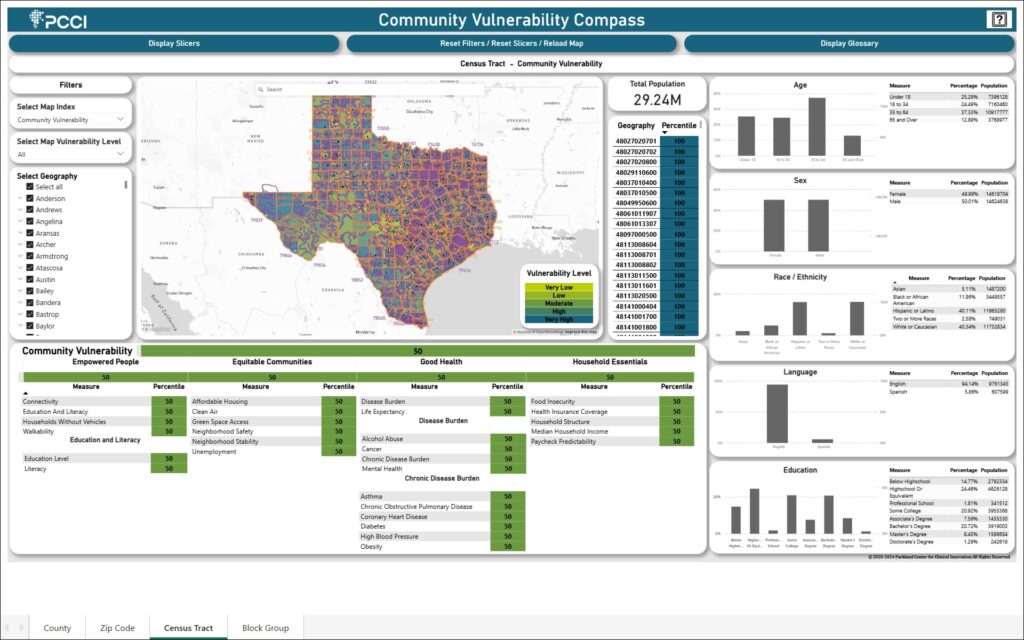
Community Vulnerability Compass
Leveraging Advanced NMDoH Analytics to Better Understand the Conditions in which We Live, Work, and Play
PCCI’s Community Vulnerability Compass (CVC) provides a clear view of a community’s NMDoH

PCCI’s Community Vulnerability Compass (CVC) is a web-based tool enabling its users to visualize and more fully understand the context and complexities of the NMDoH of a community’s most vulnerable populations. Through its alignment with the Healthy People 2030 framework, it focuses on the wide range of specific, actionable neighborhood risk factors known to influence the health of vulnerable populations at both the community and individual level. Through an easy-to-use dashboard, users can view an online mapping feature, demographic information, and specific root-cause details, such as lacking transportation or food insecurity, which are impacting vulnerability in a particular block group, census tract, or ZIP Code. With this information, organizations can use the tool to (1) proactively assess needs before determining solutions and (2) ensure a current project/plan considers and addresses the highest priorities among those served.
JAMIA Open publishes a paper on PCCI’s CVC
In a paper titled “The Community Vulnerability Compass: a novel, scalable approach for measuring and visualizing social determinants of health insights,” PCCI authors give a deep look at how the CVC is developed and deployed to create an accurate and scalable social determinants digital measurement tool that shows the true vulnerabilities residents face across our communities.
https://pccinnovation.org/jamia-open-publishes-a-paper-on-pccis-community-vulnerability-compass-cvc/
In all, CVC’s high recall for key individual-level social needs overcomes an important limitation of existing neighborhood vulnerability indexes and represents a desirable feature making CVC suitable for use as a pre-screening tool by healthcare delivery systems. A universal NMDoH screening could be implemented using CVC as an initial screening step to risk-stratify all patients based on their home address census block group. Patients living in CVC high-risk communities would then be targeted for individual-level NMDoH screening, making the process more efficient and cost-effective while still highly sensitive.
PCCI’s Community Vulnerability Compass gives University Health Transplant Institute Deeper Insights into its Patient Pool
Through leveraging CVC, the University Health Transplant Institute will obtain a deeper understanding of the context and complexities of the social barriers to health, access, and well-being of Transplant Institute patients. The CVC will give the team the ability to query a patient’s address to assess the NMDoH factors impacting that patient’s residential block group. This informs and enables more targeted screening questions and the collection of enhanced data to facilitate collaboration with community and healthcare organizations to support current and prospective patients throughout their transplant journey.

“Our Transplant DataMart is the first of its kind to use data from a large transplant program in a standardized cloud-based format by incorporating clinical metrics and non-medical drivers of health that are connected to a network of databases and other researchers across the world. This unique system will help us improve outcomes for transplant patients, perform advanced analytics, reduce barriers to care and increase grant and research opportunities to expand and share our work,” said Bryan Alsip, MD, Executive Vice President and Chief Medical Officer of University Health.”
Steve Miff, PhD
PCCI CEO

PCCI’s Community Vulnerability Compass supports Dallas County Health and Human Services Department with Data Insights into its Residents
Dallas County Health and Human Services (DCHHS) leverages PCCI’s CVC through two primary methods: utilizing the CVC Online Dashboard to strategically prioritize outreach and campaigns based on social determinants of health (SDOH) and demographic insights and integrating reverse geocoded patient addresses with CVC block group data as a proxy for SDOH. This integration is embedded into their Salesforce platform and updates dynamically as patients call in.
“Integration of the CVC into our Salesforce-based public health disease surveillance and investigation system has allowed us to get important social vulnerability data profiles on all persons with reportable conditions. This provides a truly state-of-the-art capability to gain added insights that we have never had before, to assist in us providing customized messaging, outreach efforts and linkage to needed services.”
Philip Huang, MD, MPH
Director/Health Authority, Dallas County Health and Human Services Department
United Way of Metropolitan Dallas makes PCCI’s Community Vulnerability Compass Core to its Data Capacity Building Initiative
United Way of Metropolitan Dallas (UWMD) leverages PCCI’s CVC Online Dashboard through its Data Capacity Building Initiative (DCBI) to deliver cohort-based education on integrating data into workstreams. With two cohorts per year, each comprising 12 to 15 organizations, the initiative aims, within 5 years, to equip over 200 community-based partners with enhanced resource prioritization, data-driven storytelling, monitoring, and grant or funding applications supported by robust data insights.

